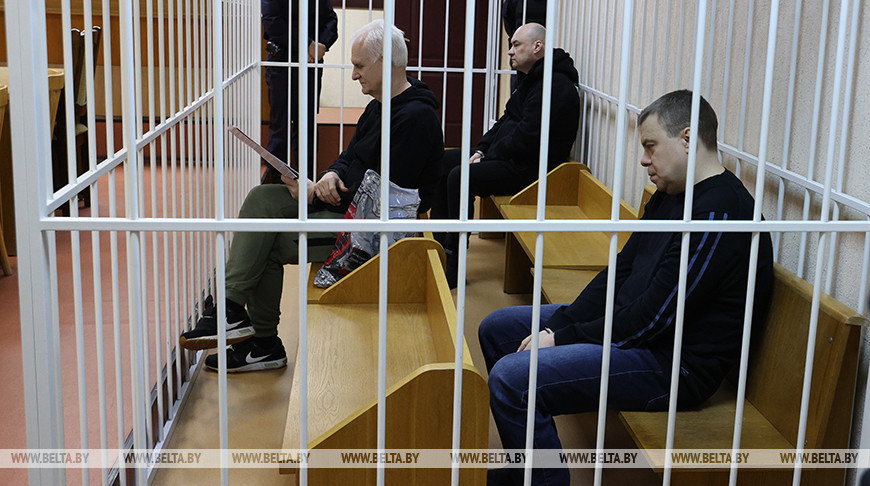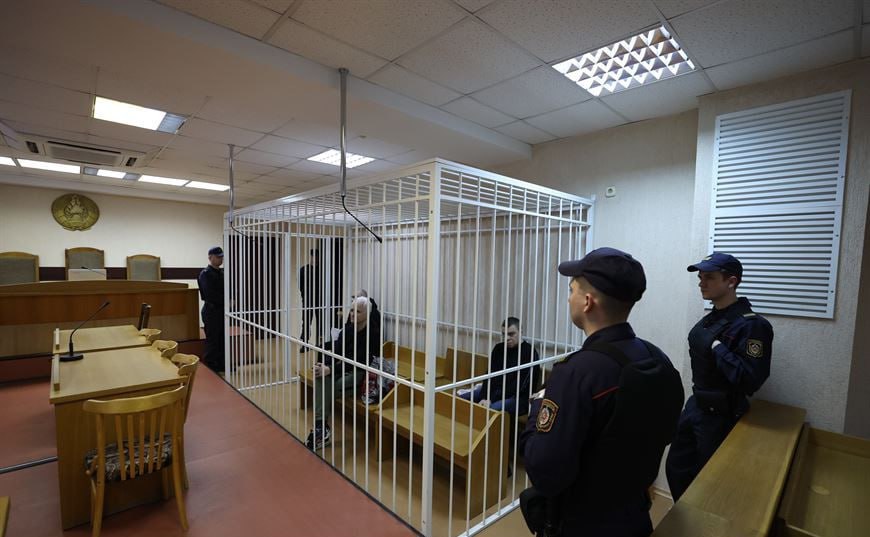Trial against Viasna: Days 6 and 7
The trial over Viasna leadership continues in the Lieninski District court of Minsk. Among the defendants is Nobel Peace Prize 2022 laureate Ales Bialiatski. The sixth and seventh court hearing in the trial against Viasna human rights defenders has been held on January 13 and 16.

Viasna members on trial: A day-by-day chronology of the court
On January 13, the court continued to interrogate witnesses and read their statements. However, not many appeared in court in person, as most of the witnesses are abroad and some had stated that they do not have money to travel to Minsk.
A witness from Homieĺ was personally questioned at the court. Previously, the man had been advised by Leanid Sudalenka, who was sentenced to three years in jail for “financing of group actions that grossly violate public order” (part 2 of Article 342 of the Criminal Code). The investigation alleged that Ales Bialiatski, Valiantsin Stefanovic, Uladzimir Labkovich, and Zmitser Salauyou “had trained citizens to participate in group actions that grossly violate public order, and also financed and materially supported such actions under the guise of human rights and charitable activities”. Their group included already convicted human rights defenders Tatsiana Lasitsa, Leanid Sudalenka, Maryia Tarasenka, Natallia Satsunkevich, and Uladzimir Vialichkin, founders of the BYSOL and By_help Solidarity Funds Andrei Stryzhak and Aliaksei Liavonchyk, the prosecution believes.
The witness said at the trial that he did not know the defendants and was generally surprised that he had been called as a witness in this case.
The rest of the witnesses scheduled for January 13 did not come to court. They had requested to hear the case without them being personally presented and mentioned lack of funds for travel, the need to care for minor children, and poor health as the reason. The human rights defenders’ lawyers objected that the stated reasons do not preclude the presence of the witnesses. They argued that their absence deprives the accused of the right to defense because they have no opportunity to ask additional questions. But despite the lawyers' objections, the court found the reasons for the non-appearance of witnesses valid and decided to read their testimony given during the investigation.
Valiantsin Stefanovic demanded to read two documents from the case, which show that the defendants were subjected to intense pressure in the pre-trial detention center. He said that the evidence was collected from the defendants with violations, as these documents also show. These documents are the Main Directorate for Combating Organized Crime and Corruption (GUBOPiK) requests to the Interior Ministry and the KGB for permission for their officers to participate in the interrogation of the accused. It is not yet known whether these agencies approved it.
Human rights defenders are still kept in handcuffs at the court. Security officers lock the doors from the inside during court sessions. Stefanovic said that they were not given food in court. The human rights defender noted that the judge should think about the nutrition of the accused and not schedule court sessions too often.
Before the start of the seventh court session on January 16, an ambulance was once again called for Uladzimir Labkovich. Six days ago, the human rights defender had already complained about not feeling well and asked for doctors. It is known that Labkovich fell ill, he had a fever. However, as before, the medics said that there were no reasons for hospitalization and that he was able to be present at the trial.
The court started studying the written materials of the case. There are 283 volumes of them in the case, each volume contains 300 pages. At the first court session, Ales Bialiatski stated that he did not have enough time to get acquainted with all of the case files. He asked for more time to review them, but Judge Zapasnik answered that one month was enough to get acquainted with the case materials and that there were no grounds for giving him more time.


















